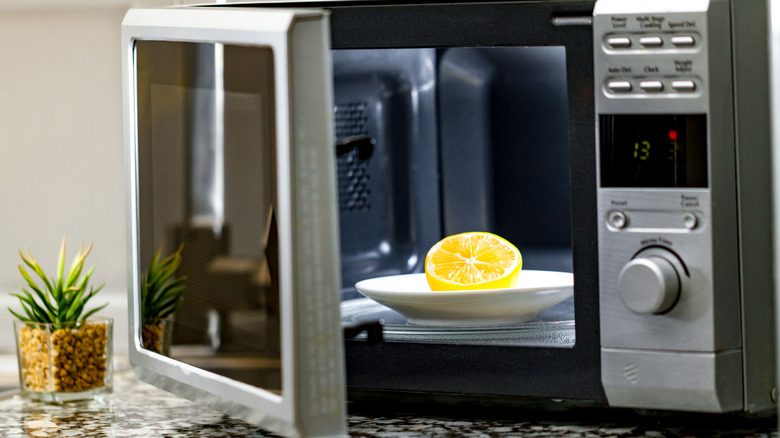The Trick To Getting More Juice Out Of Your Lemons
You may have come across recipes calling for lemon juice in quantities larger than a couple of teaspoons — and you might well have avoided them for that very reason. As tantalizing as making fresh lemonade can be, it's tedious, messy work juicing lemon after lemon. However, there's a tried and true trick for getting every drop of juice out of your citrus, allowing you to save on wasted time, effort, and fruit.
Simply pop a whole lemon in the microwave for 20 (or up to 30 seconds for large lemons) until it is warm. Carefully remove, then slice the lemon. When you take it to the juicer, you'll notice significantly more lemon juice cascading out of the fruit. Not only does this method produce more juice, it also makes the citrus softer and easier on your hands to physically juice.
The reason this works is down to physics. Lemons store their juice inside of little sacs called "vesicles", more commonly known as the pulp. When you heat up the lemon, the water inside the citrus becomes excited and breaks down the cellular walls of these vesicles. Your juicer thus has an easier time of breaking through these walls and releasing more juice. Moreover, heat also breaks down the rind, which is why it's so much easier to squeeze after a zap in the microwave.
Microwaved lemons should be warm on the outside but not quite hot to the touch. Larger lemons might benefit from additional 5-10 second zaps, but you'll generally want to keep it under 30 seconds total. Avoid nuking citrus for minutes at a time, as all that extra energy can make your fruits explode! It's not dangerous, but it is messy and doesn't get you any closer to those homemade lemon drop shots you've been craving.
How to get even more lemon juice
Although microwaving your lemons results in a big upgrade in juice production, there's usually still more liquid gold to be mined. Below are some tips that work well with the microwaving method to get every last drop.
First, try freezing, then thawing your lemons. This works similarly to the microwave method by breaking down the lemon's juice-trapping membranes. However, instead of exciting the water molecules with heat, freezing the water causes it to expand and shred the fibers inside the lemon pulp. Thaw your citrus for 4 to 8 hours, then pop it into the microwave to break down its vesicles even further. (Do NOT try to microwave frozen lemons, it won't work!)
Since you're playing with hot and cold already, give your lemons the full spa treatment with a little massage. Before slicing your frozen, thawed, then microwaved lemons, gently hand roll them on the counter for about 40 seconds to release any remaining pulp that might be clinging onto that last bit of lemon juice.
Finally, consider your juicing method and slice accordingly. Hand-squeezing works best with lengthwise cuts from the dimple to the stem end. If there is any pulp left intact, making another slice across the exposed flesh gets the juices flowing. However, if you've gone to the trouble to freeze, nuke, then massage your lemons, you might as well go for broke and bust out the classic juicer. In this case, bisect the fruit directly across its girth then go to town.
Sure, at this point, you could have saved a bunch of time by just using juice from concentrate. But sometimes there's no substitute for the real thing, and these methods will help you juice those lemons like a pro.

